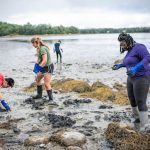
Jae Bradley '13
With the human population expected to grow by billions over the new few decades, the United Nations is predicting that by 2050 our food production must double to stave off mass starvation. For Jae Bradley ’13, that dire warning is galvanizing his summertime research.
The economics major and mathematics minor is analyzing the efficiency of soil around the globe in relation to urban density. “The premise is that rich soil should be used for farming and not-so-good soil should be used for building and development,” Bradley explained. “In the whole talk of food production and global warming, soil fertility gets lost in the discourse.”
Assistant Professor of Economics Erik Nelson, Bradley’s advisor, says his student’s work is eminently publishable due to its unique methodology and pertinent questions. “How do we meet this new demand for food, due to population growth, a wealthier population, and the pressures of climate change?” Nelson said. “It means we’ll have to shift food production, migrate crop production to other parts of the world to keep it up. Given all these pressures, we should be smart about how we use our resources – and one of our resources is soil.”
Bradley is collecting data from researchers who’ve already measured global crop output, soil fertility and the spread of cities. Using software such as ArcGIS and MATLAB to crunch his data, and running his huge spread of numbers on the College server, Bradley plans to produce a complete set of global maps by the end of the summer.
Bradley’s summertime project builds on research he completed last year on land fertility in the United States. He argued then that fertility and distance to markets have little bearing on labor and capital inputs for agriculturally heavy counties. He published his findings, which he said “fly in the face of traditional land-use theory,” in Cornell University’s undergraduate journal, The Visible Hand.
Besides working on his research this summer, Bradley, who grew up in Orono, Maine, has a Community Matters in Maine Summer Fellowship to intern at the Maine Center for Economic Policy, a public policy nonprofit in Augusta. There, Bradley is working as an analyst, researching the affects of tax laws and other policies. Bowdoin’s McKeen Center awards several Community Matters fellowships every summer to qualified students to support their work at local organizations addressing community issues.
“It’s a different way of looking at things,” Bradley said, about his MCEP job. “I’ve been used to economic research with no policy goals. It’s been research for the sake of knowledge.” He credits the fellowship with also strengthening his writing skills because he has to elucidate economic policy to people who have no background in the subject.
Next year, Bradley has a fellowship from the Surdna Foundation Undergraduate Research Program to research and write his honors project on some aspect of development. Eventually, he plans on attending graduate school in environmental economics to continue exploring the many questions that intrigue him. “For me, research is like a puzzle. You have to go through this maze to get to a final result,” he said. “How you travel through the maze is as much of a reward as the final result.”
